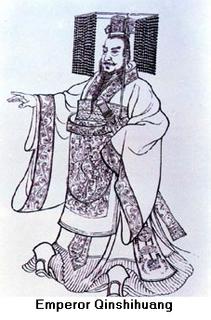Mausoleum of China's First Emperor to Remain Mystery
 People's Daily Online
People's Daily Online
________________
ChinaXianyang, Shaanxi (China):
With Jackie Chan describing the Qinshihuang Mausoleum as a zero-gravity world in his latest blockbuster "The Myth", the 2,000-year-old underground palace remains a mystery for the world. Despite curiosity about it across the world, most experts say "no" when asked about whether an excavation is feasible in the near future.
The core region of the mausoleum, about 2.13 sq km wide, is well protected from any excavation, according to Chinese experts and officials. NO EXCAVATION FORSEEABLE "The current techniques mastered by the modern people cannot ensure the mausoleum can be protected well after excavation," said Duan Qingbo, head of the Qinshihuang Mausoleum Excavation Team under Shaanxi Provincial Institute of Cultural Heritage.
The State Administration of Cultural Heritage of China has consistently opposed any unnecessary excavation at the cultural heritage sites, especially at the large-scale emperor mausoleums like the Qinshihuang Mausoleum, unless some unexpected things occur like natural disasters, tomb robberies and vital infrastructure construction. "All the objects in the tomb have been underground for thousands of years. They are used to the balance of the warmth and humidity underground and if we expose the relics to sunshine, oxygen or other gases, the balance will no longer exist and the relics will easily be ruined," said Zhang Bai, deputy-director of the State Administration of Cultural Heritage. "These changes are totally out of control," said Zhang.
"We once dug out some ivory relics from a watery pit and they looked so shiny and white, but turned into dark powder within two hours after excavation." "Excavation sometimes means destruction," said Michael Petzet, President of the International Council on Monuments and Sites (ICOMOS), "The underground Qinshihuang palace involves such a big region that we can not handle it after excavation." Zhang and Michael Petzet, together with approximately 1,000 experts from about 85 countries, are attending the 15th ICOMOS General Assembly held at Xi'an, capital of northwest China's Shaanxi Province from Oct. 17 to 21. This is the second ICOMOS General Assembly on heritage protection ever held in Asia, after the one in Sri Lanka in 1993.
"Excavation should not be carried out for fun, unless we are compelled to do so in building either important highways or high-rise buildings," he said. "We have some bad examples of excavations in Russia that soon lead to treasure hunting and tomb robberies." "Let them sleep underground. It's safer," he said.
Oct 20, 2005
 People's Daily Online
People's Daily Online________________
ChinaXianyang, Shaanxi (China):
With Jackie Chan describing the Qinshihuang Mausoleum as a zero-gravity world in his latest blockbuster "The Myth", the 2,000-year-old underground palace remains a mystery for the world. Despite curiosity about it across the world, most experts say "no" when asked about whether an excavation is feasible in the near future.
The core region of the mausoleum, about 2.13 sq km wide, is well protected from any excavation, according to Chinese experts and officials. NO EXCAVATION FORSEEABLE "The current techniques mastered by the modern people cannot ensure the mausoleum can be protected well after excavation," said Duan Qingbo, head of the Qinshihuang Mausoleum Excavation Team under Shaanxi Provincial Institute of Cultural Heritage.
The State Administration of Cultural Heritage of China has consistently opposed any unnecessary excavation at the cultural heritage sites, especially at the large-scale emperor mausoleums like the Qinshihuang Mausoleum, unless some unexpected things occur like natural disasters, tomb robberies and vital infrastructure construction. "All the objects in the tomb have been underground for thousands of years. They are used to the balance of the warmth and humidity underground and if we expose the relics to sunshine, oxygen or other gases, the balance will no longer exist and the relics will easily be ruined," said Zhang Bai, deputy-director of the State Administration of Cultural Heritage. "These changes are totally out of control," said Zhang.
"We once dug out some ivory relics from a watery pit and they looked so shiny and white, but turned into dark powder within two hours after excavation." "Excavation sometimes means destruction," said Michael Petzet, President of the International Council on Monuments and Sites (ICOMOS), "The underground Qinshihuang palace involves such a big region that we can not handle it after excavation." Zhang and Michael Petzet, together with approximately 1,000 experts from about 85 countries, are attending the 15th ICOMOS General Assembly held at Xi'an, capital of northwest China's Shaanxi Province from Oct. 17 to 21. This is the second ICOMOS General Assembly on heritage protection ever held in Asia, after the one in Sri Lanka in 1993.
"Excavation should not be carried out for fun, unless we are compelled to do so in building either important highways or high-rise buildings," he said. "We have some bad examples of excavations in Russia that soon lead to treasure hunting and tomb robberies." "Let them sleep underground. It's safer," he said.
Oct 20, 2005









